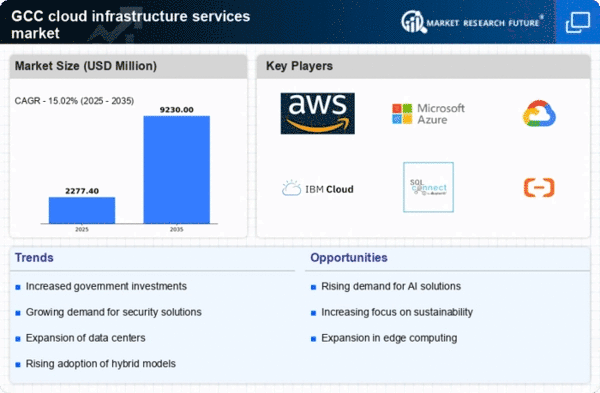Growing Demand for Scalability
The cloud infrastructure-services market is experiencing a notable surge in demand for scalable solutions. Organizations in the GCC are increasingly seeking flexible cloud services that can adapt to their evolving needs. This trend is driven by the necessity for businesses to manage fluctuating workloads efficiently. According to recent data, the market for cloud services in the GCC is projected to grow at a CAGR of approximately 20% over the next five years. This growth indicates a strong preference for scalable infrastructure that can accommodate both small and large enterprises. As companies expand, the ability to scale resources up or down without significant capital expenditure becomes crucial. Thus, the growing demand for scalability is a key driver in the cloud infrastructure-services market, enabling businesses to remain agile and competitive in a rapidly changing environment.
Increased Focus on Cost Efficiency
Cost efficiency remains a pivotal driver in the cloud infrastructure-services market. Organizations in the GCC are increasingly recognizing the financial benefits of migrating to cloud solutions. By leveraging cloud services, businesses can reduce their capital expenditures on hardware and maintenance, shifting instead to a pay-as-you-go model. This transition allows for better budget management and resource allocation. Recent studies indicate that companies can save up to 30% on IT costs by adopting cloud infrastructure. Furthermore, the ability to optimize resource usage and eliminate waste contributes to overall operational efficiency. As a result, the focus on cost efficiency is propelling the growth of the cloud infrastructure-services market, as organizations strive to maximize their return on investment while minimizing expenses.
Growing Regulatory Compliance Requirements
The cloud infrastructure-services market is increasingly shaped by the growing regulatory compliance requirements in the GCC. Organizations are facing heightened scrutiny regarding data protection and privacy, necessitating robust cloud solutions that adhere to local and international regulations. Compliance with standards such as the General Data Protection Regulation (GDPR) and local data protection laws is becoming a priority for businesses. This trend is evident as companies invest in cloud services that offer built-in compliance features, ensuring that their data management practices align with regulatory expectations. Recent surveys indicate that over 50% of GCC enterprises consider compliance a critical factor when selecting cloud service providers. Thus, the growing regulatory compliance requirements are a significant driver in the cloud infrastructure-services market, compelling organizations to adopt solutions that mitigate risks and enhance data security.
Rising Importance of Digital Transformation
Digital transformation is becoming increasingly vital for organizations in the GCC, driving the growth of the cloud infrastructure-services market. Companies are recognizing the need to modernize their operations and enhance customer experiences through digital technologies. The cloud provides the necessary tools and platforms for this transformation, enabling businesses to innovate and respond to market demands swiftly. A recent report suggests that over 70% of GCC enterprises are prioritizing digital transformation initiatives, which often necessitate robust cloud infrastructure. This trend indicates a shift towards adopting advanced technologies such as artificial intelligence and machine learning, which rely heavily on cloud capabilities. Consequently, the rising importance of digital transformation is a significant driver in the cloud infrastructure-services market, as organizations seek to leverage cloud solutions to stay competitive and relevant.
Enhanced Collaboration and Remote Work Solutions
The cloud infrastructure-services market is being significantly influenced by the growing need for enhanced collaboration and remote work solutions. As organizations in the GCC adapt to new work environments, cloud services offer the necessary tools for seamless communication and collaboration among teams. The ability to access data and applications from anywhere fosters productivity and flexibility, which are essential in today's business landscape. Recent data indicates that approximately 60% of GCC companies are investing in cloud-based collaboration tools to support their remote workforce. This trend highlights the importance of cloud infrastructure in facilitating effective teamwork and project management. Therefore, the demand for enhanced collaboration and remote work solutions is a crucial driver in the cloud infrastructure-services market, as businesses strive to maintain operational efficiency in a distributed work environment.

















